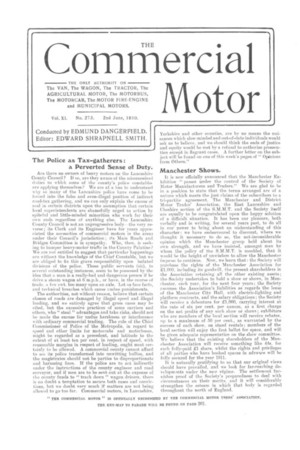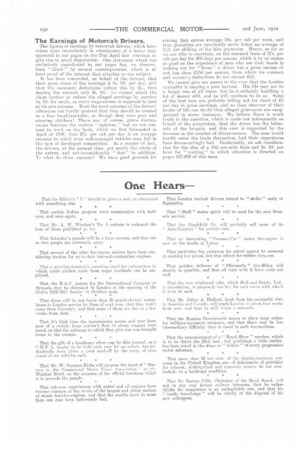The Police as Tax-gatherers : a Perverted Sense of Duty.
Page 1

Page 2

If you've noticed an error in this article please click here to report it so we can fix it.
Are there no owners of heavy motors on the Lancashire County Council ? If so, are they aware of the MiSCOCCeiVed hities to which some of the county's police eoustables are applying themselves? We are at a lass to understand why so many of the Lancashire police have come to be forced into the false and even-illegal position of indirect road-tax gathering, and we can only explain the excess of seal in certain districts upon the assumption that certain local superintendents are shamefully urged to action by spiteful and little-minded minorities who work for their own ends regardless of anything else. The Lancashire County Council is not an unprogressive body-the very reverse ; its Clerk and its Engineer have for years appreciated the necessities of commercial motors in the areas under their Council's jurisdiction ; its Main Roads and Bridges Committee is in sympathy. Who, then, is seeking to hamper heavy-motor traffic in the County Palatine? We are not. entitled to suggest that particular happenings are without the knowledge of the Chief Constable, but we are obliged to fix this grave responsibility upon isolated divisions of the police. These public servants (sic), in several outstanding instances, seem to be possessed by the idea that a man is a really-bad and dangerous person if he drive a steam wagon at 6 m.p.h., or have, in the course of trade, it few cwt. too maw" upon an axle. Let us face facts, and teelinkal breaches which cause undue punishments.
The authorities, not without reason, believe that certain classes of roads are damaged by illegal speed and illegal loading, and we entirely agree that gross cases may be cited, but the excessive practices of some carriers and others, who" steal "advantages and take risks, should not be made the excuse for undue harshness or interference with ordinary commercial trading. The rule of the Chief Commissioner of Police of the Metropolis, in regard to speed and other limits for motoreabs and motorbuses, might be regarded as a precedent, and latitude to the extent of at least ten per cent. in respect of speed, with reasonable margins in respect of loading, ought most certainly to be allowed. A commercial county cannot afford to see its police transformed into unwitting bullies, and the magistrates should not be parties to disproportionate and harassing fines. If the police are to act indirectly under the instructions of the county engineer and road surveyor, and if men are to be sent out at the expense of the county funds to "track down" wagon drivers, there is no doubt a temptation to secure both cases and convictions, but we doubt very much if matters are not being allowed to go too far. Commercial motors, in Lancashire, Yorkshire and other comities, are by no means the nuisances which slow-minded and out-of-date individuals would ask us to believe, and we should think the ends of justice and equity would be met by IL refusal to authorize prosecution except in flagrant cases. A further letter on the subject will be found on one of this week's pages of " Opinions from Others."
Manchester Shows.
It is now officially announced that the Manchester Exhibition " passes under the control of the Society of Motor Manufacturers and Traders." We are glad to be in a position to state that the terms arranged are of a nature which meets the just claims of the subscribers to a tri-partite agreement. The Manchester and District Motor Tracks' Association, the East Lancashire and Cheshire section of the S.M.M.T. and the Society itself are equally to be congratulated upon the happy solution of a difficult situation. It has been our pleasure, both verbally and in writing, for several years past, to do all in our power to bring about an understanding of this character : we have endeavoured to discount, Where we thought it necessary to do so, the not-inconsiderable opinion which the Manchester group held about its own strength, and we hare insisted, amongst men by whom the policy of the S.M.M.T. is moulded, that it would be the height of unwisdom to allow the Manchester impasso to continue. Now, we learn that: the Society will purchase the rights of the Manchester Association for £1,000, including its goodwill, the present shareholders in the Association retaining all the other existing assets; the Society undertakes to hold a show or shows, in Manchester, each year, for the next four years; the Society assumes the Association's liabilities as regards the lease of the Manchester City Hall, with electric-lighting and platform contracts, and the salary obligations ; the Society will receive a debenture for £1,000, carrying interest at the rate of six per cent. per annum, as a first charge on the net profits of any such show or shows; exhibitors who are members of the local section will receive rebates, up to a maximum of 50 per cent., as warranted by the success of each show, on stand rentals; members of the local section will enjoy the first ballot for space, and will he given adequate representation on the show committee. We believe that the existing shareholders of the Manchester Association will receive something like 44s. for each fully-paid Rd share, whilst the rights and privileges of all parties who have booked spaces in advanee will be fully secured for the year 1911. It is naturally gratifying to Its that our original views should have prevailed, and we look for far-reaching devsTopmants tinder the new regime. The settlemsnt furnishes proof of the Society's preparedness to deaf with circumstances on their merits. and it will considerably strengthen the esteem in which that body is regarded throughout the north of England.
The Earnings of Motoreab.Drivers.
The figures of earnings by motorcab drivers, which have arisen more immediately in consequence of a letter that appeared in our pages on the 21st April last continue to give rise to much disputation. One statement which was exclusively contributed to our pages has, we observe, been "lifted " by several contemporaries, which is at least proof of the interest that attaches to the subject. It has been contended, on behalf of the drivers, that their gross share of the earnings is 6s. 9d. per day, and that the necessary deductions reduce this by 3s., thus leaving the amount only 3s. 9d.--we cannot admit the claim further to reduce the alleged earnings by another Is. 6d. for meals, as every wage-earner is supposed to feed at his own expense. Even the most-extreme of the drivers' advocates ran hardly pretend that they should be treated to a free breakfast-table, as though they were poor and starving children! There are, of course, grave discrepencies between the various " opinions," hut we are content to work on the basis, which we first forecasted in April of 1908, that 27s. per cab per day is an average revenue to which even well-managed vehicles may fall in the fare of developed competition. As a matter of fact, the drivers, at the present time, get nearly the whole of the extras, and not-inconsiderable "tips" in addition. To what do these amount? We have good grounds for stating that extras average 10s. per cab per week, and that gratuities are practically never below an average of
per shilling of the hire payments. Hence, so far as we are able to ascertain, on the assumed basis of 27s. per cab per day for 300 days per annum, which is by no means as good as the experience of men who use their heads in looking out for "fares," a driver has a gross income of not less than £250 per annum, from which his common and necessary deductions do not exceed £45.
We cannot give our assent to the view that the London taxicabby is reaping a poor harvest. His life may not be a happy one at all times, but he is certainly handling a lot of money still, and he will continue to do so. Some of the best men are probably falling not far short of .£1 per day in gross earnings, and no close observer of their modes of life can doubt that alleged grievances are exaggerated in many instances. We believe there is much truth in the assertion, which is made not infrequently on behalf of the proprietors, that the driver has the better side of the bargain, and this view is supported by the increase in the number of driver-owners. The men would hardly enter the trade themselves, had their experiences been *disconcertingly had. incidentally, we ask eonsideralion for the idea of a 10d.-per-mile basis and 2s. 6d. per hour for " waiting," to which attention is directed on pages 267-268 of this issue.
























